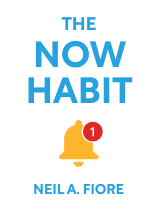

This article is an excerpt from the Shortform book guide to "The Now Habit" by Neil A. Fiore. Shortform has the world's best summaries and analyses of books you should be reading.
Like this article? Sign up for a free trial here.
What is Neil Fiore’s The Now Habit about? What is the key message to take away from the book?
According to psychologist and productivity coach Neil Fiore, the problem isn’t that we’re lazy—it’s that procrastination is a symptom of the fear and anxiety we sometimes feel about our work. In his 1988 book The Now Habit, Fiore explains what procrastination is, why we do it, and most importantly, how to avoid it.
Below is a brief overview of The Now Habit by Neil Fiore.
The Now Habit: A Strategic Program for Overcoming Procrastination and Enjoying Guilt-Free Play
Why do we put off the things that matter most to us, even when we know that doing so makes us unhappy in the long run? That’s the question at the heart of Neil Fiore’s classic The Now Habit, which teaches you how to overcome procrastination by understanding why we do it. Fiore argues that procrastination isn’t caused by laziness and can’t be fixed by trying harder. Instead, procrastination is a symptom of the fear and anxiety we sometimes feel about our work—and to solve it, you have to address those underlying emotional struggles. Fiore explains how to do just that using psychological and time-management strategies. He asserts that if you follow his advice, you’ll get more done, feel better about yourself, and enjoy life more.
Fiore is a psychologist, trainer, and productivity author. The Now Habit by Neil Fiore draws on previous productivity literature as well as Fiore’s own coaching experience to present a comprehensive program for correcting procrastination. The book was originally published in 1988. In 2007, Fiore released a second edition that includes a new introduction and additional suggestions for dealing with internet-related distractions, but the core of the book remains the same.
Part 1: Why We Procrastinate
Fiore argues that before we can tackle procrastination, we need to understand why we procrastinate in the first place. His central idea is that procrastination isn’t a character flaw—it’s a symptom of underlying psychological distress.
Debunking the Myth: Procrastination Isn’t Laziness
Fiore says that traditionally, we tend to think that procrastination results from laziness. In this view, procrastination in itself is the fundamental problem: It results from a failure of motivation or willpower, and the solution is to try harder and be more disciplined. In contrast, Fiore argues that procrastination isn’t the primary problem—instead, he says that we procrastinate because we’re anxious about starting (or finishing) a task. In his view, procrastination is a natural coping mechanism that we adopt in order to deal with the stress we feel about the task.
Unfortunately, Fiore argues, we’ve been conditioned by parents, teachers, supervisors, and society at large to believe the laziness interpretation—which only makes the problem worse. He says we’re taught that work should be difficult and unpleasant and that playing and relaxing are frivolous wastes of time. As a result, he says, we come to dread work, which makes us want to avoid it—but then we feel guilty whenever we’re not working, and we’re unwilling to schedule deliberate time to play (since that time could be “better” used by doing more work).
These attitudes combine to form a vicious cycle: We feel so much stress and guilt about work that we hide from it by procrastinating, which only adds to the stress and guilt, leading to more avoidance. And because we feel we can’t play (at least, not until our work is done, which it never is), we begin to resent work for keeping us from the things we’d rather be doing.
Fiore says that the solution is to undo our traditional assumptions about work and play. His idea is that by making time for leisure and relaxation, we lead more balanced and fulfilling lives, and we stop resenting work for taking up all our time. Likewise, instead of assuming that work should be difficult and unpleasant, he recommends finding ways to make it easier so as to lower the pressure we feel around it.
Why We Dread Work
Fiore says that procrastination is a symptom of anxiety about work, so in order to better understand why we procrastinate, we’ll start by looking at some of the reasons we find work so stressful in the first place.
Perfectionism
Fiore argues that the most common reason we dread work is perfectionism—we set impossibly high standards for ourselves and tell ourselves there will be dire consequences for not meeting those standards. For example, a student might tell herself she has to get straight As or else she’s a failure who’ll never get a good job. Fiore points out that we often adopt these standards from others—parents, teachers, bosses, and so on.
According to Fiore, perfectionism makes it hard to even start working on something. If your goal is to be perfect, you’re all but guaranteed to fail—so why even put in the effort? Then, Fiore says, once we procrastinate, we typically feel bad and tell ourselves we’re lazy. That negative self-talk creates more anxiety, which in turn only makes it harder to get back to work by creating even more pressure.
Fear of Success
Whereas perfectionism makes us avoid working because we fear failure, Fiore says that it’s also possible to procrastinate because we fear success. Fear of success can occur for several reasons:
1) We fear that we’ll alienate our friends, colleagues, or family if we outperform them. For example, a straight-A student might deliberately reduce the effort she puts into her schoolwork for fear that her friends will brand her a “nerd” or “teacher’s pet.”
2) We’re uneasy about the major life changes that sometimes come with success. For example, a successful job search might mean moving to a new place, adapting to a new social environment, and learning a new set of skills and responsibilities.
3) We fear that succeeding will raise other people’s expectations until we hit the point where we’re guaranteed to disappoint them. For example, our hypothetical student might not want to earn straight As because she suspects that earning them once will make her parents and teachers expect her to earn them every semester.
Frustration and Powerlessness
Lastly, Fiore argues that we sometimes procrastinate as a way of controlling our situation. For example, if you feel powerless in your job, you may subconsciously feel that avoiding work is the only way to express yourself. Similarly, Fiore points out that if you’ve internalized the lesson that you should always be working and should never take time to play, you might conclude that there’s no point in working hard because hard work just leads to more hard work. When that happens, we procrastinate because procrastination seems like our only possible escape from the drudgery of life itself.
The Pattern of Procrastination
Now that we’ve explored why we procrastinate, we’ll examine what procrastination actually looks like so that you can recognize it in your own life. Fiore says that procrastination tends to follow a predictable pattern:
1) You make a task seem more momentous than it really is by thinking that your identity, happiness, worthiness, and so on depend on your success. For example, if you have a job interview, you might tell yourself that you need this job to keep your life on track and that if you don’t get it, you’ll be a failure. Suddenly your entire future—and your value as a person—seems to rest on a brief conversation with a stranger.
2) You determine that only perfect success is good enough and that anything less would be catastrophic. This makes the task seem impossibly difficult and frightening. For example, you might tell yourself that you have to completely blow away your interviewer. All your answers need to be eloquent and insightful. You can’t misspeak or look the slightest bit unprepared. Obviously, this is a completely unreasonable standard to expect of yourself.
3) Because of the pressure you’ve piled onto the task, you freeze up—instead of starting on the task, you just keep thinking of all the things that could go wrong. For example, instead of planning for the interview, you just keep telling yourself how difficult and stressful the interview will be and how likely you are to screw it up. In other words, when the self-imposed stress becomes too much, you procrastinate by avoiding the task altogether.
4) Finally, you wait until some external pressure—like an impending deadline or consequence—forces you to do the task. Because you’re rushed, you’re likely to do the task in a haphazard way, which means you won’t do it as well as you were capable of. For example, your job interview is on the calendar—no matter how much you procrastinate, you’ll have to show up whether you’re prepared or not.
Fiore argues that part of the reason procrastination becomes ingrained is that it has several dubious benefits:
1) It gives us some short-term relief from the stress we feel about the task. This relief is only temporary, as it leads to more stress and guilt down the line—but that’s not always obvious in the moment.
2) It relieves the burden of perfectionism because when we procrastinate, we know we’re not doing our best. This means that any flaws in our results seem to reflect on us less than if we’d tried our hardest. We tell ourselves that any mistakes or imperfections resulted from our lack of time and effort, not our lack of ability.
3) On some level, procrastination works. Most of the time, the task does get done in the end. Whether that’s because an external pressure forces us to do it, because somebody else completes the task for us, or because we wait so long that the task becomes irrelevant, we learn that procrastination is a flawed but viable strategy.
Part 2: How to Overcome Procrastination
Now that we’ve seen what procrastination is and where it comes from, we can look at some strategies for changing it. Because procrastination comes from our anxiety about work and because that anxiety in turn stems from how we think about and approach work, most of Fiore’s suggestions involve changing your relationship to work (and to play). Specifically, he suggests developing more positive self-talk, changing how you plan your week, changing your approach to work, and learning how to focus while working.
Strategy #1: Change How You Talk to Yourself
One way to change how you think about work in order to avoid procrastination is to change your self-talk. Fiore argues that procrastinators typically talk to themselves in “have to” and “should” statements—both of which only build negative feelings that then lead to procrastination. According to Fiore, if you tell yourself you “have to” do something, you make yourself a powerless victim of circumstance because you feel like other people or external circumstances are coercing you to do whatever it is. This causes undue stress, pressure, and resentment.
Likewise, if you tell yourself you “should” do something, you make that thing into a moral issue—you’re a bad person if you don’t do it. If you tell yourself that things “should” be different than they are, you start to think that the world is bad and unfair. And if you tell yourself you “should” be more like someone else, you devalue yourself and define yourself as inadequate. In short, Fiore says that “should” statements lead to depression that saps your energy and motivation to work.
The answer to these problems, Fiore says, is to change your self-talk to emphasize choice and agency. In other words, instead of telling yourself you “have to” or “should” do things, tell yourself you “choose to” or “want to” do things. Doing so, Fiore says, removes the unnecessary stress and judgment and puts the emphasis on your wants and your agency.
How to Deal With Worry
Fiore says that sometimes we procrastinate because we’re worried about what can go wrong with a task or project. This happens especially when, as discussed earlier, we artificially inflate the stakes of a task and demand perfection from ourselves. But worry only worsens procrastination by making you more stressed. To defuse worry, Fiore suggests that you:
1) Realistically determine the worst thing that could happen. Often this worst-case scenario (if we’re realistic about it) isn’t as bad as our unexamined worry makes us think.
2) Think about how you’d respond if the worst did happen. What would you do? How would you handle it? Whom could you turn to for help? Fiore says that questions like these help you see that even if something truly catastrophic happens as the result of failure, it won’t be the end of the world.
3) Think about what you can do right now to avoid the worst-case scenario and instead move yourself toward your goals. Doing so forces you to turn your worry into a practical and actionable plan.
Strategy #2: Change How You Plan Your Week
In addition to addressing the psychology of procrastination, Fiore gives detailed time management suggestions designed to counteract procrastination before it has a chance to get started.
Plan Play, Not Work
Fiore’s fundamental planning idea is that you should plan your week around your leisure time, not your work. He recommends that you start by writing down specific appointments as well as necessary activities like eating and sleeping. Next, add scheduled leisure time—which can include play, socializing, hobbies, self-care (for example, exercise or meditation), and so on.
Fiore recommends scheduling at least half an hour of recreation or relaxation per day. He also recommends dedicating one day entirely to play—in other words, one day completely free of work (though he says it’s okay to tackle a few small chores that you didn’t have time for elsewhere).
Fiore says that following these guidelines forces you to see how little time you actually have for work in a given week—which in turn motivates you to make the most of what time you do have. He says that this approach also guarantees that you take time to play and that you don’t feel guilty for doing so. The idea is to reduce your resistance to work by making it seem less overwhelming.
Don’t Schedule Your Work—Track It
You probably noticed that Fiore’s scheduling guidelines mention necessities, appointments, and play, but say nothing about work. That’s because Fiore advises against scheduling work in advance. Instead, he recommends that throughout the week, you record work as you do it, and only if you follow these rules:
1) Only record blocks of work after you’ve done at least half an hour of uninterrupted quality work on a project. This rule has two goals: 1) To break your work into manageable chunks so you don’t get overwhelmed, and 2) to encourage you to stick with a project even when it’s challenging.
2) Take a break after each block of work. Either rest or move to a more enjoyable task. The idea is to reward yourself for starting and sticking with something hard and to recharge your motivation and creativity.
3) Total up your hours of quality work each day and for the whole week, and celebrate your accomplishments. Fiore says that simply keeping this record is rewarding and that you’ll feel motivated to do more work as you watch your tally of hours accumulate.
Strategy #3: Change How You Approach Projects and Goals
Fiore says that his scheduling guidelines will change how you think about work’s relationship to the rest of your life. But even if you feel less resentful about having to do work, you might still find yourself procrastinating. Sometimes, the problem might be how you think about the work itself—especially when tackling a large or complex project. Therefore, Fiore gives several suggestions for how to approach large projects while avoiding procrastination-spawning emotions like fear and anxiety.
Avoid Overwhelm by Breaking Down Projects
Sometimes we procrastinate because we’re overwhelmed by the enormity or complexity of the task in front of us. We’re not sure what to do, and we doubt our ability to complete the work. Other times, we underestimate how much work will be needed or how long it’ll take. To help avoid these problems, Fiore recommends breaking down large projects into smaller steps.
For example, say you want to buy Christmas presents for your friends and family. If you just add “buy Christmas presents” to your to-do list, you might find yourself avoiding the task—it sounds like a lot of work, and you’re not immediately sure what needs to be done. Plus, it’s only October, so you have plenty of time. This is a recipe for procrastination: The task itself is complex but ill-defined, which encourages you to put it off until you start panicking about the deadline and beating yourself up for not starting sooner—neither of which will help your shopping (or your holiday spirit).
Fiore says you can avoid these problems by breaking down “buy Christmas presents” into its component tasks. These tasks might include making a list of everyone you want to give presents to, brainstorming present ideas for each recipient, and so on. Next, Fiore recommends that you set deadlines for each step in the process. For example, if you’re mailing presents, you’ll need to know the last date to ship with guaranteed delivery by Christmas.
Breaking down projects in this way has two benefits. First, it gives you a more realistic sense of your timeline. You avoid unpleasant surprises and undue stress by figuring out ahead of time how long things will probably take. Second, you create a manageable action plan, which in turn makes it easier to actually do the work. Instead of trying to nebulously “buy Christmas presents,” it’s much easier to motivate yourself to take half an hour to pick out a new sweater for Uncle Bob.
Avoid Perfectionism by Emphasizing Starting Rather Than Finishing
Even once you have a detailed plan for tackling a major project, you might still find yourself procrastinating instead of doing the work. Fiore says this is another place where perfectionism gets in our way. He explains that we often focus too much on the end product—and because we want the finished product to be perfect, we never take the first steps of actually starting.
To counteract these tendencies, Fiore recommends you think of a project as a series of small starts. This advice works well with the previous suggestion to break down projects into their component tasks—instead of worrying about how you’ll finish all of your Christmas shopping, you can consult your list of small tasks and decide which one to start in your next 30-minute work session.
Focusing on starting is also a psychological shift—it doesn’t literally mean that you always start something new and never come back to a partially completed task. The idea is that emphasizing starting instead of finishing removes the pressure to be perfect or to get things right the first time. Fiore warns that sometimes we think we’re working on a project when in fact we’ve fallen into a trap of never-ending research, preparation, and planning—past a certain point, he says, activities like these are just another form of procrastination.
Strategy #4: Learn to Focus While Working
As we saw with the previous work-tracking guidelines, Fiore points to the importance of staying focused while working. For him, being focused means getting into a flow state and avoiding distractions.
Getting Into a Flow State
Fiore argues that you can avoid procrastination and work more efficiently if you get into a flow state—a state of enhanced calm, concentration, creativity, and ease. Fiore suggests that you can enter a flow state by performing focusing and relaxation exercises before starting a work session. Fiore gives detailed instructions for the exercises, which combine deep breathing, mindfulness techniques, and positive affirmations.
Dealing With Distractions
To help you concentrate and get into a flow state, Fiore recommends having a plan to deal with distractions as they arise. He argues that most distractions can be handled the same way: Write down the distracting thought or impulse and get back to work. That way, you don’t procrastinate on one task by doing another, but you also don’t forget to do genuinely important things later. He says the one exception to this technique is strong emotions, which might require you to take a few minutes to sort through your feelings before returning to work.
Anticipating Procrastination
Finally, Fiore recommends tackling resistance in advance by mentally rehearsing before you get to work—in other words, visualize what you plan to work on as well as the resistance and distractions you expect to face. This way, Fiore says, you can come up with strategies for overcoming resistance and distraction ahead of time and you’ll be prepared when these obstacles come up.

———End of Preview———
Like what you just read? Read the rest of the world's best book summary and analysis of Neil A. Fiore's "The Now Habit" at Shortform.
Here's what you'll find in our full The Now Habit summary:
- Why people tend to put off the things that matter the most
- Where procrastination stems from, and why it doesn't mean you're lazy
- How to get more done while still maintaining a balanced life






